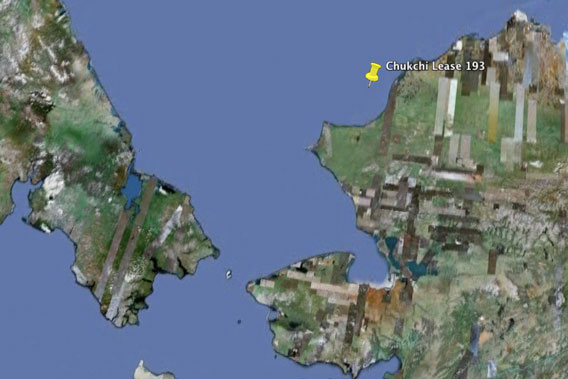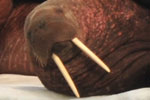
Approximate location of Chukchi Lease 193 as seen on Google Earth, though the lease spans nearly 30 million acres. The Chukchi Sea is north of the Bering Straight. On the image: Alaska is to the right and Russia to the left.
Nearly 500 Arctic oil and gas leases from the Bush administration have been restarted this week by the Obama administration. Known as Chukchi Lease 193, the various leases had been held up in court after environmental groups and indigenous groups challenged them, citing a significant lack of baseline information about the Chukchi Sea ecosystem. The Obama administration now says that many of the ecosystem gaps need not be filled, but Arctic indigenous and environmental groups disagree.
“[The] decision to affirm the lease sale—instead of requiring that important scientific information be gathered and proven methods for cleaning up an Arctic oil spill be developed before opening the Chukchi Sea to oil and gas companies—shows that the Obama administration has backed away from its stated commitment to make decisions ‘based on sound science and the public interest, and not on the special interests’,” reads a statement from 16 NGOs and communities.
Critics of Arctic drilling argue that given the extreme weather conditions, icy waters, and the remoteness of any oil well, it would currently be impossible to clean-up an oil spill adequately. Furthermore, clean-up efforts would almost certainly have to stop during the long Arctic winter.
Still, Dutch Royal Shell, which bought a number of the leases and would the first to drill, says they are confident in their plans.
“We believe the Chukchi Plan we submitted in May of this year is technically and scientifically sound, and we look forward to exploring this critical part of our Alaska portfolio in 2012,” Curtis Smith with Shell Alaska said.
In August Shell had the largest oil spill in the UK in a decade, while the oil giant also accepted responsibility over the summer for two massive oil spills in Nigeria in 2008 totaling 11 million gallons of crude. A thorough report from the United Nations Environment Program (UNEP) found widespread pollution devastating Nigerian people and ecosystems.
Caroline Cannon, president of the Native Village of Point Hope, said: “[with this decision] President Obama tells the Inupiat people of Alaska’s Arctic coast that our culture is disposable. Because without adequate information about the ways in which the Chukchi Sea’s marine ecosystem functions and without a proven plan to clean up an oil spill in this ice-covered, extreme environment, oil drilling in our Arctic waters will spell disaster for our survival as a people.”
Shell was recently given a green light by the Obama administration to drill in the Arctic’s Beaufort Sea next summer, however environmental groups are fighting that in court.
Environmentalists have become increasingly frustrated with the Obama administration after a string of decisions that support big industry over environmental protections, including dropping new clean air standards and an allegedly cozy relationship with the Canadian tar sands industry ahead of a decision to allow a new pipeline to cross the US.
New regions of the Arctic are opening to industrial interests such as oil and gas, given that climate change is melting the region’s summer sea ice even faster than expected. Many environmentalists warn that the melting ice should be seen as an undeniable message to deal with global dependence on fossil fuels and not an opportunity to burn more, thereby worsening global warming.
Related articles
Deepwater spill ‘meets the Titanic’: groups sue to stop Arctic drilling
(09/29/2011) Following the Obama administration’s approval of Royal Dutch Shell to drill in the Arctic’s Beaufort Sea, a wide-swathe of environmental have filed a lawsuit to stop the drilling, which could begin as early as next summer. Those filing the lawsuit today blasted Shell for what they perceived as a pathetic oil spill response plan, and the Obama administration for acquiescing to the big oil company.
Deepwater oil spill likely to hurt fish populations over decades
(09/28/2011) Oil pollution doesn’t have to kill fish to have a long-term impact, according to a recent study in the Proceedings of the National Academy of Sciences (PNAS). Researchers found that Gulf killifish (Fundulus grandis) that had been exposed to very low to non-detectable levels of oil contamination from the Deepwater oil spill last year, still showed developmental problems that are likely to impact fish populations for decades to come.
Mass walrus haul-outs, polar bear cub mortality linked to climate change

(09/01/2011) Recent, unprecedented walrus haul-outs and increased instances of long-distance swims by polar bears show the direct impacts on wildlife of dwindling Arctic sea ice from climate change. These threatened species also face the prospect of offshore drilling in the Arctic after the Obama Administration recently approved a number of plans to move forward on oil exploration. At least 8,000 walruses hauled out on an Alaskan beach along the Chukchi Sea on August 17. Only a day before, the U.S. Geological Survey announced it would begin tagging walruses near Point Lay, Alaska to study how a lack of sea ice is affecting the species







